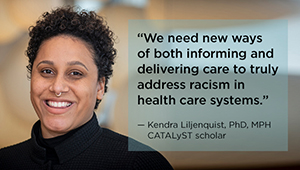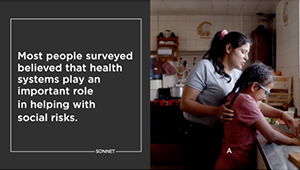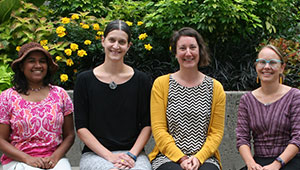Social Determinants of Health
Research overview
Social, economic, and behavioral factors can influence the trajectory of one’s health so significantly they have been coined the “social determinants of health” or SDoH. Those factors include:
- Personal characteristics such as race, ethnicity, culture, sex, gender identity, and sexual preference
- Economic resources such as educational attainment, employment, income, wealth, and housing
- Built environment such as transportation systems, access to healthy foods, and walkability
- Adverse experiences such as childhood trauma, interpersonal violence, relationship disruption, or bereavement
Researchers at Kaiser Permanente Washington Health Research Institute (KPWHRI) are committed to understanding how the health care system can best identify, understand, and appropriately respond to these factors to improve the health of our members and our communities.
“Through our evaluation and research, we hope to help empower patients to better manage the social and behavioral factors that influence their health,” said Clarissa Hsu, PhD, KPWHRI associate investigator.
Our institute researchers have long been interested in SDoH. Examples include our work in areas such as tobacco addiction and the integration of treatment for behavioral health issues into primary care. We’ve worked on efforts such as reducing racial disparities in care, opioid overuse, and vaccine hesitancy. Our Center for Community Health and Evaluation has helped to promote and sustain healthy communities; our Center for Accelerating Care Transformation (formerly known as the MacColl Center for Health Care Innovation) has championed the Chronic Care Model and has been committed to helping U.S. primary care practices — including community health centers — integrate community resources into health improvement.
Moving forward, we intend to make targeted improvements in the lives of Kaiser Permanente members, but, as these examples suggest, we also work in communities around the nation for broad impact. Here are just a few examples of KPWHRI’s current work related to SDoH:
- Moving to Health
This project is designed to pinpoint what matters most about individual neighborhoods for their residents’ health. Funded by the National Institute of Diabetes and Digestive and Kidney Diseases, researchers will track individuals and the built environment in their neighborhoods to see how changing communities affects factors such as people’s long-term weight and blood sugar — and whether they develop diabetes.
- LINCC (Learning to Integrate Neighborhoods and Clinic Care)
Researchers on this project, funded by the Patient-Centered Outcomes Research Institute, are testing how adding a community resource specialist role in primary care can help connect people with community resources that support health and wellness.
- Team-based opioid management
The goal of this project is to improve safe prescribing and chronic opioid medication for patients with non-cancer pain in rural primary care clinics across Washington and Idaho. Led by KPWHRI’s Center for Accelerating Care Transformation (ACT Center), the project is helping clinics develop policies, workflows, registries, tool kits, and other resources to better support patients with chronic pain. The work is funded by the Agency for Healthcare Research and Quality.
- Addressing financial hardship
In projects funded by the Robert Wood Johnson Foundation, a team of KPWHRI researchers is learning how health care systems can do a better job of talking transparently with patients about the cost and value of their health care. The goal is to help identify “best practices” for making tools and resources part of regular workflows in clinics. Doing so could ultimately help patients have a better understanding of what their care will cost — information that’s important for helping individuals make informed decisions about treatment based on their own values.
KPWHRI researchers are committed to gaining a holistic understanding of people’s lives — one that can best inform prevention, intervention, and implementation efforts, maximizing the public health impact of our efforts.
KPWHRI researchers have a unique constellation of methodological strengths — including qualitative analysis, implementation science, and experience with evidence reviews, evaluation design and methods, measurement development, big data analysis for community intervention evaluation, pragmatic trials, user-centered design, survey research, and community-based participatory research. These strengths are coupled with substantive expertise (for example, nutrition, physical activity, behavioral health, economic and racial disparities, prevention and health promotion, child health and development, and stigma), and a multi-disciplinary, team-science-based approach that is needed to tackle these “thorny issues.”
We hope to realize the optimal role of the health care system in addressing social, economic, and behavioral needs, and partner with the community to create much needed change.
Recent publications on Social Determinants of Health
McCloskey JK, Ellis JL, Uratsu CS, Drace ML, Ralston JD, Bayliss EA, Grant RW Accounting for Social Risk Does not Eliminate Race/Ethnic Disparities in COVID-19 Infection Among Insured Adults: a Cohort Study 2022 Apr;37(5):1183-1190. doi: 10.1007/s11606-021-07261-y. Epub 2022-02-02. PubMed
Tuzzio L, Wellman RD, De Marchis EH, Gottlieb LM, Walsh-Bailey C, Jones SMW, Nau CL, Steiner JF, Banegas MP, Sharp AL, Derus A, Lewis CC Social Risk Factors and Desire for Assistance Among Patients Receiving Subsidized Health Care Insurance in a US-Based Integrated Delivery System 2022 Mar;20(2):137-144. doi: 10.1370/afm.2774. PubMed
Simon GE, Bindman AB, Dreyer NA, Platt R, Watanabe JH, Horberg M, Hernandez A, Califf RM When Can We Trust Real-World Data To Evaluate New Medical Treatments? 2022 Jan;111(1):24-29. doi: 10.1002/cpt.2252. Epub 2021-05-01. PubMed
Simon GE, Platt R, Watanabe JH, Bindman AB, John London A, Horberg M, Hernandez A, Califf RM When Can We Rely on Real-World Evidence to Evaluate New Medical Treatments? 2022 Jan;111(1):30-34. doi: 10.1002/cpt.2253. Epub 2021-04-25. PubMed
Brown MC, Kava C, Bekemeier B, Ornelas IJ, Harris JR, Chan KCG, Robertson M, Hannon PA. Local health departments' capacity for workplace health promotion programs to prevent chronic disease: Comparison of rural, micropolitan, and urban contexts. J Public Health Manag Pract. 2021 Sep-Oct;27(5):E183-E188. doi: 10.1097/PHH.0000000000001182. PubMed
Berry AB, Lim CY, Liang CA, Hartzler AL, Hirsch T, Ferguson DM, Bermet ZA, Ralston JD Supporting collaborative reflection on personal values and health 2021 Oct;5(CSCW2):1-39. doi: 10.1145/3476040. Epub 2021-10-18. PubMed
Hawley CN, Huber CM, Best LG, Howard BV, Umans J, Beresford SAA, McKnight B, Hager A, O'Leary M, Thorndike AN, Ornelas IJ, Brown MC, Fretts AM. Cooking for Health: A healthy food budgeting, purchasing, and cooking skills randomized controlled trial to improve diet among American Indians with type 2 diabetes. BMC Public Health. 2021 Feb 15;21(1):356. doi: 10.1186/s12889-021-10308-8. PubMed
Oh H, Glass J, Narita Z, Koyanagi A, Sinha S, Jacob L Discrimination and Multimorbidity Among Black Americans: Findings from the National Survey of American Life 2021 Feb;8(1):210-219. doi: 10.1007/s40615-020-00773-z. Epub 2020-05-26. PubMed
Researchers in Social Determinants of Health
 Claire Allen, MPHManager, Collaborative Science |
 David E. Arterburn, MD, MPHSenior Investigator |
 Kimberly Arthur, MPHCollaborative Scientist |
 Paula R. Blasi, MPHSenior Collaborative Scientist |
 Jennifer F. Bobb, PhDSenior Biostatistics Investigator |
 Katharine A. Bradley, MD, MPHSenior Investigator |
 Meagan C. Brown, PhD, MPHAssistant Investigator |
 Allen Cheadle, PhDSenior Investigator, KPWHRI; Senior Research Associate, CCHE |
 Andrea J. Cook, PhDSenior Biostatistics Investigator |
 Nicole M. Gatto, PhD, MPHPrincipal Collaborative Scientist |
 Beverly B. Green, MD, MPHSenior Investigator |
 Nora Henrikson, PhD, MPHAssociate Investigator |
 Clarissa Hsu, PhDAssociate Investigator |
 Morgan Justice, MASenior Collaborative Scientist |
 Gwen Lapham, PhD, MPH, MSWAssociate Investigator |
 Paula Lozano, MD, MPHSenior Investigator; Director, ACT Center |
 Theresa E. Matson, PhD, MPHCollaborative Scientist |
 Linda K. McEvoy, PhDSenior Investigator |
 Jess Mogk, MPHCollaborative Scientist |
 Robert Penfold, PhDSenior Investigator |
 Dori E. Rosenberg, PhD, MPHSenior Investigator |
 Lily N. Shapiro, PhDCollaborative Scientist |
 Gregory E. Simon, MD, MPHSenior Investigator |
 Kelsey Stefanik-Guizlo, MPHCollaborative Scientist |
Affiliate researcher
Emily Williams, PhD, MPH
University of Washington School of Public Health
















